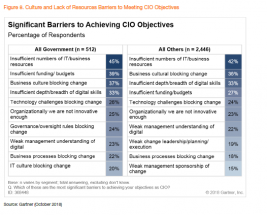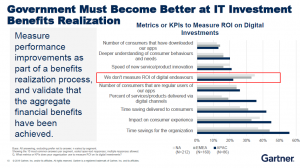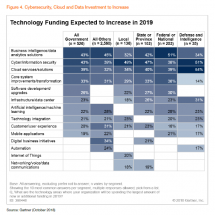
Bureaucrats see digital as a priority but fundamentally lack resources to roll-out initiatives, new research shows.
The report, from global advisory Gartner, calls on government technology leaders to ramp up investment in digital business initiatives after a survey of 528 public sector CIOs found they were trailing behind their private sector colleagues on investment in digital.
Despite noting digital as a top priority, only 17 per cent of government CIOs said they planned to increase their investment in digital business initiatives compared to 34 per cent of CIOs in other industries.
The findings were released at the Gartner Data and Analytics Summit in Sydney this morning.
Almost half of government CIOs lack the resources to execute their digital vision, according to the survey, with 45 per cent saying they lack the necessary IT and business resources.
Some 39 per cent said that insufficient funding and budgets were the biggest barriers to achieving CIO objectives, followed by business culture and insufficient breadth of digital skills.

Despite 29 per cent saying they were scaling and refining their digital initiatives, compared to 13 per cent the previous year, governments are still lagging behind the private sector in the ability to scale up projects.
Measuring value in IT investment
Government leaders need to refocus their efforts on investing in digital business initiatives at scale to meet increased demand for effective and efficient services, Gartner says.
Rick Howard, government research agenda manager at Gartner says that CIOs need to be tracing the measurable benefits of IT investment throughout the lifecycle of projects, and making these benefits known to citizens and within government.
“It’s really incumbent upon the technologists to tell the story of why this is important, why the technology is important to achieve the desired outcome,” Mr Howard told Government News.

“You have to bring the same mindset you would if you were a commercial enterprise, that same level of discipline and focus.”
Mr Howard said bureaucrats need to be thinking about the end-goal throughout the lifecycle of a project, and in value terms that will be understood by citizens and officials.
Data underpins value capture
Data is key to delivering IT projects with value that is measurable, and governments need to treat data like a strategic asset, sharing it between different parts of the organisation, he says.
“So much of government data remains locked up in program or department silos when that information has great value. Data often remains specific to programs that acquire and use it, but not other programs that could combine it to create greater insight,” he said.
Focusing on advancing stakeholder buy-in for digital initiatives by articulating the benefits to other executives through a focus on mission and outcomes is essential, the report says.
Key areas to invest
Business intelligence and data analytics are the greatest areas of increased technology investment this year, followed by cyber security and cloud services, the report shows.
Investment in cloud has dropped from the leading area of investment last year, to second this year. But Mr Howard says cloud will increasingly be seen as a strategically acquired asset over the next 12 to 18 months.

The report also found that funding for infrastructure and data centre technology as areas with the greatest spending decrease (33 per cent), followed by software development and upgrades and networking communications (15 per cent each).
Game-changing technology
Artificial intelligence and machine learning topped this year’s list of the greatest game-changing technologies in government, followed by data analytics and cloud technologies.
The rise of AI will introduce new opportunities for governments to scale in magnitudes not previously possible, the report says, while it will also allow the reallocation of human resources to other more complex decisions.
Mr Howard says that AI is a huge area of opportunity that all CIOs should be looking at investing in – and preparing their data for.
“The use and emergence of AI and machine learning is really important for governments to begin to prepare their data for automation… to help your workforce become more effective through use of AI,” he said.
The survey found 39 per cent of CIOs intend to deploy AI in the next one to two years, with 36 per cent intending to deploy the technology in the next two to three years.
Comment below to have your say on this story.
If you have a news story or tip-off, get in touch at editorial@governmentnews.com.au.
Sign up to the Government News newsletter.

Reading this article is like recounting many discussions I have had with a number of my professional counterparts in the records and information management field over the last few years and since the Australian Government set up the Digital Transformation Office. There are many aspects that need to be achieved, understood and collaborative frameworks that need to be developed in the Government Sector and signed off on (including the break down of internal and external silos ) These frameworks are slowly getting there, faster in some government sectors/ organisations than others. The Federal Government is however requiring closer collaboration over the 3 Tiers of Government in Australia in information sharing and management and this should push the issue.( Ah politics and public sector finances) This is where Professional Associations in the information management field can greatly assist the process at the Federal, State and Local Government level as there is a high level of expertise within these groups that can bring context to the overall. Very important in aggregating information/data for public, evidentiary, privacy and strategic use in policy development